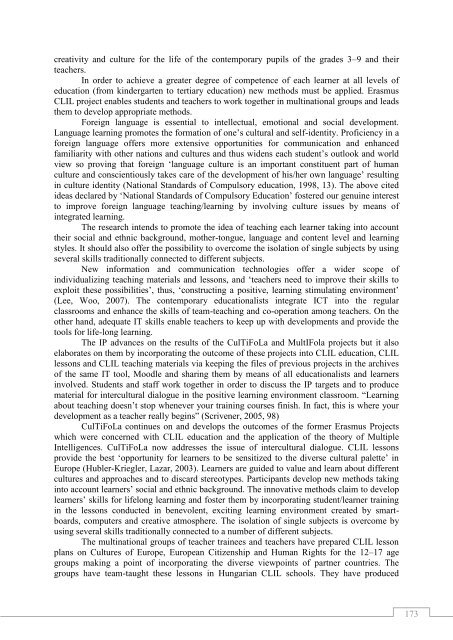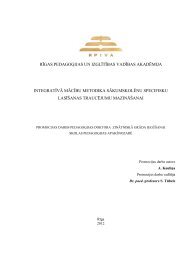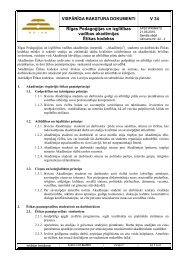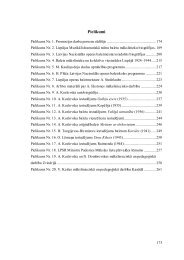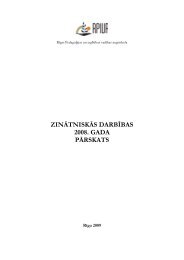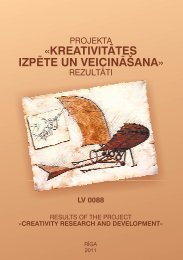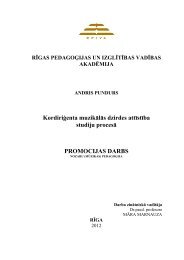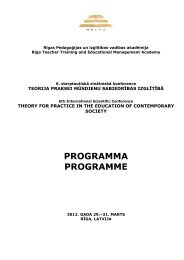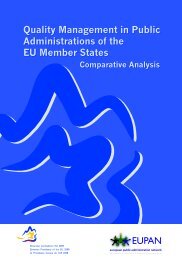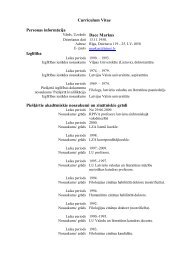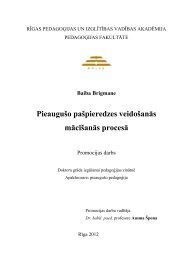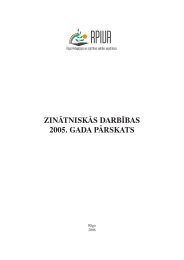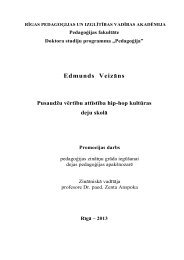You also want an ePaper? Increase the reach of your titles
YUMPU automatically turns print PDFs into web optimized ePapers that Google loves.
creativity and culture for the life of the contemporary pupils of the grades 3–9 and theirteachers.In order to achieve a greater degree of competence of each learner at all levels ofeducation (from kindergarten to tertiary education) new methods must be applied. ErasmusCLIL project enables students and teachers to work together in multinational groups and leadsthem to develop appropriate methods.Foreign language is essential to intellectual, emotional and social development.Language learning promotes the formation of one‘s cultural and self-identity. Proficiency in aforeign language offers more extensive opportunities for communication and enhancedfamiliarity with other nations and cultures and thus widens each student‘s outlook and worldview so proving that foreign ‗language culture is an important constituent part of humanculture and conscientiously takes care of the development of his/her own language‘ resultingin culture identity (National Standards of Compulsory education, 1998, 13). The above citedideas declared by ‗National Standards of Compulsory Education‘ fostered our genuine interestto improve foreign language teaching/learning by involving culture issues by means ofintegrated learning.The research intends to promote the idea of teaching each learner taking into accounttheir social and ethnic background, mother-tongue, language and content level and learningstyles. It should also offer the possibility to overcome the isolation of single subjects by usingseveral skills traditionally connected to different subjects.New information and communication technologies offer a wider scope ofindividualizing teaching materials and lessons, and ‗teachers need to improve their skills toexploit these possibilities‘, thus, ‗constructing a positive, learning stimulating environment‘(Lee, Woo, 2007). The contemporary educationalists integrate ICT into the regularclassrooms and enhance the skills of team-teaching and co-operation among teachers. On theother hand, adequate IT skills enable teachers to keep up with developments and provide thetools for life-long learning.The IP advances on the results of the CulTiFoLa and MultIFola projects but it alsoelaborates on them by incorporating the outcome of these projects into CLIL education, CLILlessons and CLIL teaching materials via keeping the files of previous projects in the archivesof the same IT tool, Moodle and sharing them by means of all educationalists and learnersinvolved. Students and staff work together in order to discuss the IP targets and to producematerial for intercultural dialogue in the positive learning environment classroom. ―Learningabout teaching doesn‘t stop whenever your training courses finish. In fact, this is where yourdevelopment as a teacher really begins‖ (Scrivener, 2005, 98)CulTiFoLa continues on and develops the outcomes of the former Erasmus Projectswhich were concerned with CLIL education and the application of the theory of MultipleIntelligences. CulTiFoLa now addresses the issue of intercultural dialogue. CLIL lessonsprovide the best ‗opportunity for learners to be sensitized to the diverse cultural palette‘ inEurope (Hubler-Kriegler, Lazar, 2003). Learners are guided to value and learn about differentcultures and approaches and to discard stereotypes. Participants develop new methods takinginto account learners‘ social and ethnic background. The innovative methods claim to developlearners‘ skills for lifelong learning and foster them by incorporating student/learner trainingin the lessons conducted in benevolent, exciting learning environment created by smartboards,computers and creative atmosphere. The isolation of single subjects is overcome byusing several skills traditionally connected to a number of different subjects.The multinational groups of teacher trainees and teachers have prepared CLIL lessonplans on Cultures of Europe, European Citizenship and Human Rights for the 12–17 agegroups making a point of incorporating the diverse viewpoints of partner countries. Thegroups have team-taught these lessons in Hungarian CLIL schools. They have produced173


